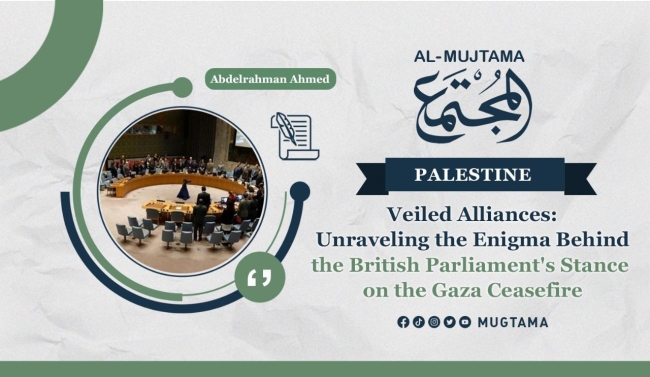Veiled Alliances: Unraveling the Enigma Behind the British Parliament's Stance on the Gaza Ceasefire
The influence of Zionism in Britain has been intertwined with British interests since the mid-19th century, coinciding with the disintegration of the Ottoman Caliphate. These changes provided Britain with an opportunity to enter the Arab region under the umbrella of "foreign missions," establishing ties with the Zionist movement. In 1830, then-British Foreign Secretary Henry Temple undertook the task of creating a national homeland for Jews to fulfill Britain's objectives. The first British consulate in Jerusalem was inaugurated approximately eight years later.
As Jews gradually acquired land in Palestine and established Jewish settlements, the Balfour Declaration of 1917 sealed the planned establishment of the State of Israel. Since then, successive British governments, whether conservative or labor, have generally supported Israel and endorsed its policies.
The late 1970s saw the formation of the first local Zionist lobby organizations in Britain. The Zionist Federation and the British Jewish Council united to establish the first British public relations organization supportive of Israel. In 1974, the "Friends of Israel in the Conservative Party" group was founded by Conservative MP Michael Fidler as a lobbying group supporting Israel. According to the Financial Times, this group has provided the Conservative Party with around £400,000 in donations since 2004.
The British Electoral Commission website reports that at least 162 Conservative Party members were sent on trips to the occupied territories by "Friends of Israel" between 2004 and the present, including Boris Johnson. Additionally, more than a third of the Cabinet ministers traveled outside the UK with direct funding from the Israeli government or its affiliated pressure groups, such as "Friends of Israel," to ensure Israel's representation in the British Parliament.
In 2004, Boris Johnson went on a 5-day trip to Israel, funded jointly by the Israeli government and Friends of Israel. Johnson only disclosed the trip in the parliamentary register of interests four years later, in 2008, and refused to reveal the cost. George Osborne, the then-Chancellor of the Exchequer, who was also on the trip, announced his visit two weeks after returning.
Between 2011 and 2015, five other ministers – Alok Sharma, Kwasi Kwarteng, Robert Jenrick, Oliver Dowden, and Amanda Milling – traveled to Israel on fully or partially funded trips. Michael Gove and Priti Patel also received funding to visit Washington to attend the AIPAC conference, the leading pro-Israel lobbying group in the United States, in 2013.
A probe by "Open Democracy" revealed information on visits to the occupied Palestinian territories, including meetings arranged by Lord Polak, honorary president of the group, with then-Development Secretary Priti Patel in 2017, which included a meeting with Israeli Prime Minister Benjamin Netanyahu.
Political commentator Peter Oborne revealed in a documentary on Channel 4 how this lobby operates within the British Parliament, detailing the behind-the-scenes tactics used when dealing with the print and visual media.
The Guardian reported on November 16, 2009, that pro-Israel organizations in Britain were eagerly anticipating an increase in their influence if the Conservatives won the upcoming elections. This might explain the British Parliament's vote against the Gaza ceasefire resolution, despite widespread grassroots, civic, and human rights activism in Britain.
In conclusion, the historical ties between British interests and Zionism, coupled with the activities of pro-Israel lobbying groups within the British political landscape, provide a nuanced understanding of the UK's stance on issues related to Israel and Palestine. The financial and political support received by politicians from these groups, coupled with the historical context, sheds light on the complexities of the UK's position and its parliamentary decisions regarding the Israeli-Palestinian conflict.


